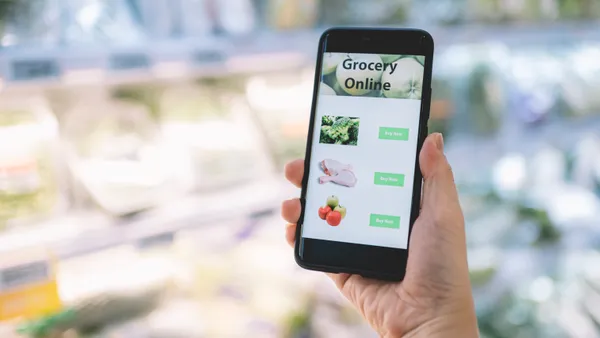Dive Brief:
- Ahold Delhaize is seeing signs that its recent acquisition of New York online grocer FreshDirect is helping it gain ground with omnichannel consumers in the nation's largest metropolitan area, according to Frans Muller, the Dutch grocery conglomerate's chief executive.
- The company expects to see online sales in the United States grow more than 70% in 2021, driven by revenue from FreshDirect as well as an expansion in the number of click-and-collect locations across its fleet of supermarkets, Muller said during an earnings call on Wednesday.
- Ahold Delhaize is looking to tap momentum from FreshDirect as it looks to juice sales at Stop & Shop, which serves the same region as the e-grocer and is the only one of the company's U.S. brands that it is not seeing market share expand.
Dive Insight:
When Ahold Delhaize announced late last year that it planned to take over FreshDirect, Muller pointed to the opportunity to build the grocer's presence in the highly competitive New York City market as a central reason for the investment.
As it had hoped, Ahold Delhaize is finding that its early efforts to integrate FreshDirect with the rest of its operations, especially Stop & Shop, are helping it attract customers that had in the past proved elusive.
"What we have seen is that a lot of FreshDirect customers also would like to have ... a strong supermarket on their side. And that gives us an opportunity with Stop & Shop and with FreshDirect to combine and to capture that omnichannel proposition for customers in the New York area," Muller said during the call.
Ahold Delhaize is also looking to tap its private labels to strengthen FreshDirect's center store sales. The company is now offering house brands carried by its Hannaford banner to FreshDirect customers as it seeks to retain what Muller said is the "very high loyalty" of the e-grocer's existing customers.
The company is particularly optimistic that bringing FreshDirect and Stop & Shop closer together will benefit its operations. Both brands are being tested by a growing bench of online as well as brick-and-mortar competitors, including discounter grocers, Amazon and ultrafast delivery companies. In May, Ahold Delhaize said FreshDirect co-founder and CEO David McInerney had resigned and would be replaced on an interim basis by Farhan Siddiqi, Ahold Delhaize's chief digital officer.
Stop & Shop has recently been moving along a different track than Ahold Delhaize's other banners in the United States in some respects. The chain's e-commerce penetration is the highest among Ahold's U.S. store brands, Ahold Delhaize Chief Financial Officer Natalie Knight said during the call, but it has been unable to gain overall market share even as its sister banners, which include Food Lion, The Giant Company and Giant Food, in addition to Hannaford, have all seen their businesses expand.
Meanwhile, Food Lion, which has the lowest e-commerce sales rate among Ahold Delhaize's U.S. banners, just posted its 35th consecutive quarter of comparable sales growth, Muller said. Overall, Ahold Delhaize's e-commerce penetration rate is at about 7% in the United States, he said, adding that Food Lion's online sales are growing at the fastest clip among its U.S. supermarket chains.
Overall, Ahold Delhaize's U.S. operations recorded comparable sales that were down 1.5% during the second quarter. Same-store sales were up 19.1% compared with the same period in 2019.
Muller said Stop & Shop has benefited from its ongoing store-remodeling efforts. The company renovated 14 stores in Q2, pushing the total number of stores in the chain, which runs more than 400 supermarkets in the Northeast, to nearly 100. The remodeled stores have generated "solid sales lifts," Muller said during the call.
Muller added that he is optimistic Ahold Delhaize's ongoing investments in micro-fulfillment technology will bear fruit for the grocer. Those projects include an MFC at a facility The Giant Company is building in Philadelphia and several more MFCs for Stop & Shop following the deployment of one in Hartford, Connecticut, in 2019.
"We are very much convinced that micro-fulfillment centers close to customers … [are] the right thing to go forward," Muller said.













